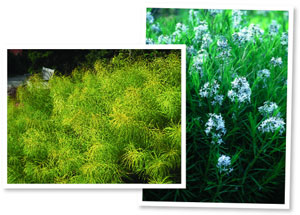4/15/2010
Amsonia: A Winner Worth Growing
Allen Bush
 Amsonia hubrichtii
Amsonia hubrichtii, the Threadleaf Bluestar, is the Perennial Plant Association’s (PPA) 2011 Plant of the Year. The species is named in honor of Leslie Hubricht, who discovered the Arkansas and Oklahoma native in 1942. The plant has four notable qualities. Any one of these would make it garden worthy, but the complete package makes it compelling. Amsonia has clusters of small powdery blue, star-shaped blooms in May and June. The soft, needlelike leaves form a handsome, low-maintenance, shrubby display of great textural beauty. The foliage turns a brilliant golden-yellow color in October and plants are very long-lived. In addition, the low-maintenance perennial, hardy from Zones 4 to 9, has stand-alone ornamental appeal, but is at its best when massed in larger landscape groupings of a half-dozen or more. Plants eventually mature at nearly 48 in. tall with a slightly broader berth.
Propagation
Seed propagation is the most economic production method, but tip cuttings can be rooted under mist. Vegetative material can either be forced under plastic in winter or 3-in. to 4-in. tip cuttings can be taken from outdoor stock following spring flowering through early August. This allows time for rooting and hardening off before winter.
Heavy flowering can’t be counted on until the third season, but if seeds are sown before mid-year and plants are vernalized, flowering will occur by spring 2011 when market demand created by the PPA award hits full stride.
There are two options for seed sowing. The easiest and quickest method is with Jelitto’s Gold Nugget Seed. These treated seeds can be ordered several weeks prior to sowing and germination will begin evenly over a period of two to three weeks with warm greenhouse temperatures of 68F to 75F (20C to 23C). Sow Gold Nugget Seed within two to three weeks of receipt into deep, open flats or into 72 or 128 cells. Two to three seeds can be sown in each cell. Jelitto recommends using 30 grams regular seed to produce 1,000 plants (90 seeds/g.). With Gold Nugget Seed, use one to two seeds per cell, or 15 grams to produce 1,000 plants (80 seeds/g). Expect 80% germination on Gold Nugget Seed within seven to 12 days with warm greenhouse temperatures, but use cooler temperatures (54F to 60F /12C to 15C) following germination during the winter months. The species forms a taproot and deep plugs are preferable.
The alternative method requires a few extra steps and more time—as much as a year of natural stratification of moist warm and cold temperatures—but will result in germination of 60% to 75%. Before Gold Nugget Seed, growers sowed seed in deep open flats and provided warm conditions for three to four weeks, and then fluctuated cool temperatures in a range from 32F to 40F (0C to 4C) for three to four weeks or more.
Sometimes there is a spontaneous germination of 5% to 10% germination after the first three to four weeks. This can happen in cool houses between November and March. Greenhouse temperatures are warmed to 68F to 75F (20C to 23C) and germination takes place irregularly over a three- to four-week period. Seed flats shouldn’t be discarded because subsequent germination will occur after repeating the process.
Within four to six weeks of germination, seedlings can be shifted into containers and grown on. Amsonia is ideally suited for quart-sized (4½-in.) containers the first year. It isn’t necessary, but cutting foliage back once will keep plants more compact. Amsonia isn’t a heavy feeder, but 150 to 200 ppm nitrogen can be used weekly or a slow release 18-6-12 can be applied at a rate of 1 tsp. for 4½-in. or 2 tsp. for 6-in. containers. The Threadleaf Bluestar will be ready for sale six to eight weeks following potting. GT
Allen Bush is Director of Special Projects for Jelitto Perennial Seeds.